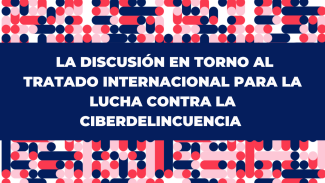Perspectives of AlSur organizations regarding the discussion of the international treaty to fight cybercrime
Cybercrime is currently a global concern. Therefore, several States are creating tools to combat it. International organizations, such as the UN and the World Economic Forum, have drawn attention to the issue. As it is a phenomenon without borders, there is an increased interest in having more coordination and cooperation mechanisms for the prevention and punishment of crimes committed through information and communication technologies.
The Budapest International Convention on Cybercrime (2004), promoted by the Council of Europe, was signed by several Latin American countries, including Argentina, Chile, Colombia, Costa Rica, Panama, Paraguay, Peru and the Dominican Republic. Other countries such as Ecuador, Guatemala, Mexico and Brazil are, so far, observers. Although this is a recognized international instrument, for several years several countries have sought the creation of another international framework to expand its premises.
Along these lines, through Resolution 74/247 of 2019, the United Nations General Assembly decided to create an Ad Hoc Ad Hoc Intergovernmental Committee to begin the elaboration of an international Convention to combat cybercrime. This Ad Hoc Committee convened a first meeting in May 2021, in New York City, to establish a framework and the organization of six discussion sessions to work on the elaboration of a draft, which would take place from January 2022.
AlSur's organizations Derechos Digitales, R3D, Karisma and Hiperderecho have been following this process and participated in several of the sessions and open consultations. One of the initial concerns regarding the possible elaboration of an international convention or treaty on cybercrime refers to its scope and safeguards to protect human rights.
In February 2022, prior to the first working session of the Ad Hoc Committee, 120 organizations and specialists sent a letter to Faouzia Boumaiza Mebarki, chair of the Ad Hoc Committee. In this letter, they pointed out the risks of addressing cybercrime since, due to the lack of consensus on its definition and implications, it can be used to criminalize and restrict activists, journalists, researchers, among others. The need for accreditation of members of civil society was also mentioned to allow for active participation and monitoring of the process.
Throughout 2022, different aspects of the treaty were addressed and several of the problems that had already been pointed out became evident. The first was the unresolved discussion on what constitutes a strict cybercrime (core cybercrimes) as opposed to a whole range of other crimes in which technologies may be involved. As Derechos Digitales portrays, when the issue was discussed, disagreements became explicit.
Hiperderecho, in one of the sessions, was able to emphasize the need to include a gender perspective and the need to regulate criminal offenses and prevention measures in relation to the modus operandi of cybercriminals, with full respect for human rights.
In January 2023, the fourth working session was held with the revision of a consolidated negotiation document (CND). In this regard, 90 civil society organizations and academia addressed a new letter to the Ad Hoc Committee, in which concerns about general provisions and criminalization provisions, along with procedural and law enforcement measures, are mentioned. The scope of reference of the CND is overly broad with respect to several types of offenses and is not limited to more specific cybercrimes. In turn, it includes provisions that may even criminalize activities that are not aligned with states' human rights obligations.
Derechos Digitales has compiled a list of issues that deserve special attention, maintaining a perspective that the CND document does not take into account safeguards to avoid its negative impact on the activities of journalists, whistleblowers, activists and researchers. An important aspect, for example, refers to criminal investigation measures, which should be detailed, proportional and have adequate controls to avoid abuses.
R3D similarly took a position on criminalization provisions and procedural measures, reiterating the need to focus only on strict cybercrimes. The broad and vague wordings directly affect our fundamental rights such as: the right to privacy, freedom of expression, the right to peaceful assembly and the right to non-discrimination.
There are still two more sessions ahead and, surely, an intense debate on the content of the provisions of this eventual international instrument. As well as important deliberations in each of the States once they decide whether or not to adopt this instrument. A Convention on cybercrime could have major consequences for the legislation of our countries and affect our online coexistence and our use of technology. It is therefore necessary that more organizations, researchers, activists and citizens in general can follow up on this issue. Any instrument for the prevention and punishment of crime must be generated with the utmost respect for our human rights.
You can follow the participation of AlSur organizations in their respective accounts on social media platforms.
We leave you some articles from AlSur member organizations:
Derechos Digitales:
https://www.derechosdigitales.org/17961/
Hiperderecho:
R3D:



